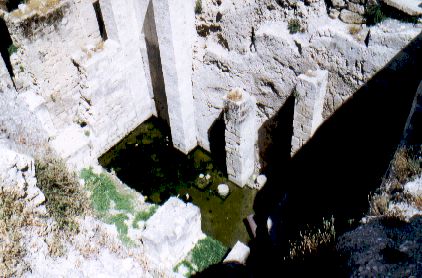Read John 5:17-47
So, because of the Jewish Leaders' persecution of Jesus after healing the lame man, Christ stops and gives seven proofs of his right to heal the lame man on the Sabbath and four witnesses of his right, ultimately pointing to the fact that he is God.
Let's look at Christ's Deity shown in His...
1. Service
2. Will
3. Intelligence
4. Power
5. Honor
6. Power to Give Life
7. Sovereignty to Send Men to Heaven/Hell
1. Christ's Deity as shown in His Service (verse 17-18)
The phrase "my father" that Christ uses here means more than what we mean when we say "God our Father." Christ is literally saying that He is God's Son, and the Jews recognize this. Christ saying "and I work" shows that he does the same thing as his Father. In other words, Christ is saying that he does the same thing that God does.
2. Christ's Deity as shown in His Will (verse 19)
When Christ says that he can do nothing by himself, he isn't saying that he is helpless. Rather, he is saying that He can do nothing of his own self. Or, you could say that He and the Father are of the same will (verse 30). If we look at other passages of the Bible, we see in Luke 2:49 that Jesus explains that His Father's business is His priority, in John 4:34, Christ says that He is sustained by doing God's will, and Luke 22:42, Jesus explains that His Father's plan is more important than His physical desires. All of this says that Christ and God share the same will.
3. Christ's deity as shown in His Intelligence (verse 20)
When Christ says that the Father shows him all things, he is meaning that there are no secrets between them because they have equal knowledge. Another thought on this, why would God discuss "all things" with a man? He isn't going to do that! He would only reveal His will completely to Christ.
4. Christ's deity as shown in His Power (verse 21)
Christ is basically laying out here the fact that he has the same power and right to heal and raise whom He will. He has all of the same rights and privileges of the Father. They key phrase that is used here is "to whom he will." In other words, we might have the ability to harm someone, but we don't have the right to do that. Only Christ as the power to do as he pleases.
5. Christ's deity as shown in His Honor (verse 22 and 24)
Because Christ is the judge of all men, he deserves the same honor and glory as the Father does. In other words, he is equal with God.
6. Christ's Deity as shown in His Power to Give Life (verses 24-26)
Christ demonstrates here that he is equal with God in His power to save the lost and to provide eternal life.
7. Christ's deity as shown in His Sovereignty to Send Men to Heaven and to Hell (verse 27-29)
Verse 27 seems to echo verse 22 here and we see that because God has given the Son the ability to judge, that all should honor Christ. In addition, the Father has committed all judgement to the Son because is both the Son of God and the Son of Man. In other words, because he walked on earth as a man and lived a perfect life, he is the only one who has the right to judge all.
So, not only does Christ give these seven proofs of His deity and equality with God,, but he also stops and just to really back himself up, provides four witnesses of His deity as well. (In standard Jewish court, two witnesses were all that were required, so Christ was in overdrive here.)
Witness #1: John the Baptist (verses 32-35)
John was a witness and testified that Christ was the true Messiah.
Witness #2: Christ's Own Works (verse 36)
His miracles, specifically the seven John records, that demonstrate different aspects of Christ's deity.
Witness #3: The Father (verses 37-38)
God showed Himself and His "endorsement" of Christ at Christ's Baptism.
Witness #4: The Word of God (verses 39-47)
When Christ says "you search the Scriptures," he's basically pointing out the obvious and saying, "come on, you should know this!" They were searching the Scriptures for doctrinal and practical truth, but missed the real deal. People do this today. They can know the Bible, and yet never really know Christ.

